In all honesty, I don’t eat a huge amount of Dutch food. Yes, I live in the Netherlands – but it seems that even the average Dutch person doesn’t eat that much of their national cuisine – especially those who live in Amsterdam. Yes, we might order some bitterballen or ossenworst with our beer, or perhaps indulge in Dutch pancakes on a hungover Saturday, but a full a full meal of Dutch food? Not so much. And yet, when I’m approached to write articles, it’s the topic I’m most likely to be asked to write on. And so, I thought long and hard and I came up with this list of Dutch restaurants in Amsterdam…
Where to eat… Dutch food in Amsterdam
Before we get into the list of actual restaurants, a quick note about food tours and dining events. I’ve taken absolutely loads of food tours (partly because I was editorial manager at a food tours company for three years) and I genuinely think they’re an excellent way to get to know a city. In Amsterdam’s case, they’re also a great way to get to know Dutch food, as they allow you to taste lots of small snacks without having to commit to an entire meal. I recommend the food tours by Eating Amsterdam and Devour Tours although there are other options on TripAdvisor. If I may offer one further piece of advice: if you’re only in Amsterdam for a long weekend or a short stay, take your food tour on day one. No only with it help you to get your bearings geographically, but your tour guide can also give you recommendations for where to eat over the coming days.
Another great option is booking a dinner experience in someone’s home. EatWith offers a couple of events that look like they fit the bill nicely, including this four-course Dutch meal and this canal house dinner overlooking the River Amstel.
Want to eat more than Dutch food in Amsterdam? Download my Amsterdam Restaurant Guide:
Best Dutch Restaurants in Amsterdam
Traditional: ‘t Heemelrijck
Purporting to have been going strong since 1949, ‘t Heemelrijck is the epitome of traditional Dutch dining. The wood-clad walls are stained a (faux) dark brown, there are Delft blue plates climbing the staircase (and everywhere else), while even the tables are covered in carpet! If you had a Dutch grandmother, this could be her dining room. The food is an equally traditional Dutch-French mashup: think venison pâté with berry compote, biefstuk (Dutch-style steak), rich beef stew, and stamppot (either andijvie or sauerkraut mixed with mashed potato) served with a giant Dutch meatball or a typically Dutch sausage. Washed down with some French wine or Dutch beer, this is some proper comfort food for an autumnal evening.
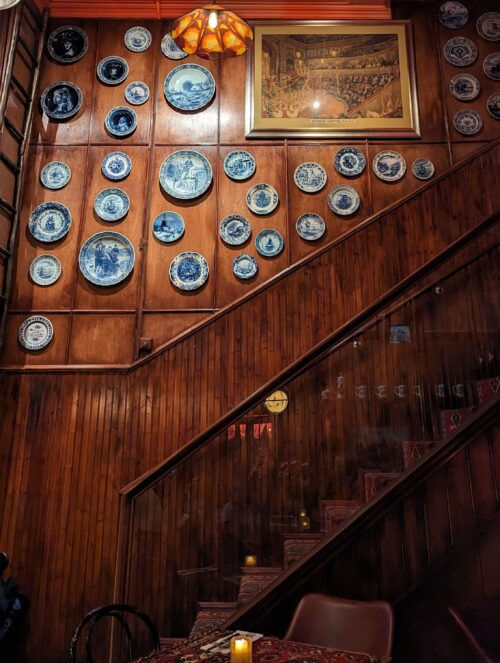
Modern: Wilde Zwijnen
Wilde Zwijnen translates as “wild boar” in English, although I’ve been disappointed never to see it on the menu. That said, you won’t be disappointed with the creative, seasonally led Dutch cuisine on offer at this modern classic restaurant. They serve a fixed three-, four- or five-course menu that can be vegetarian, fish-based or meat-based (including game) depending on your preferences. And everything comes from Dutch soil, waters or fields.
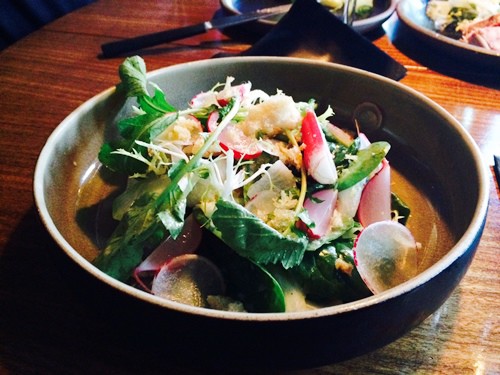
Local: de Kas
You can’t get much more local than plucking your fruit, veggies and herbs from your own garden or greenhouse. And that’s exactly what de Kas (meaning: greenhouse) does at their Amsterdam restaurant adjacent to the Frankendael Park. What they can’t source from their own grounds, they procure from nearby farms. The menu is heavy on vegetables (unsurprisingly) so dinner at de Kas leaves you feeling light and a little virtuous, too.
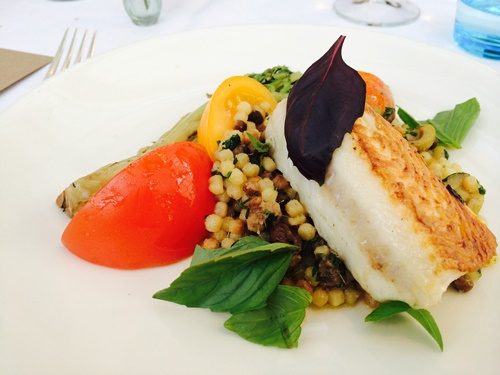
Hotel restaurant: Carstens
Hotel restaurants went through a decade or two of falling out of fashion, but thankfully they’re now holding their own – and housing some of Amsterdam’s best restaurants. I was recently invited to Carstens Brasserie, in the Park Plaza Victoria hotel – handily located right next to Centraal Station. Perhaps unusually for a restaurant catering to visitors, the menu really does focus on Dutch food – right down to the wine list that featured no less than three Dutch bottles from the south of the country. We ordered the four-course chef’s menu, and particularly enjoyed the roasted tomatoes with hangop (a strained yoghurt that’s similar to labneh) and the pork belly with Dutch seaweed and a tart beurre blanc. It all paired perfectly with the Apostelhoeve Cuvée XII: a white blend of Müller-Thurgau, Auxerrois and Pinot Gris from Limburg, the Netherlands’ southernmost (and hilliest) province.
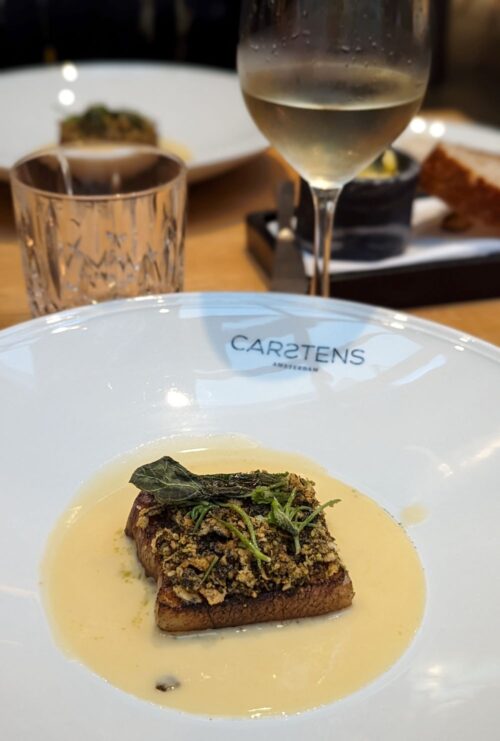
Editor’s note: I was invited to eat at Carstens Brasserie as a journalist, and I didn’t pay for my meal. Obviously I try to be as objective as possible, but I always disclose when I’ve had a freebie.
Dutch eetcafes: Cafe Hesp and Myrabelle
The funny thing about eetcafes (literally, casual cafés that you eat in) is that a quick glance at the menu might not scream Dutch food – but they’re an inextricable part of Dutch culture. They’ll generally serve hearty, meaty fare like a simple steak & chips or pork schnitzel with salad (although there will always be at least one veggie option). My favourite Dutch eetcafe staple, however, is the satay: a skewer of marinated meat (generally chicken or pork) with lashings of sweet-savoury peanut sauce. It’s a bastardised version of an Indonesian dish, which has become a national favourite the way chicken tikka masala has become a national favourite in the UK. Unsurprisingly then, satay generally comes with chips (fries) and mayonnaise, a few pickles and some prawn crackers. A classic Dutch eetcafe will always serve satay alongside a selection of beer and jenever (and lots of other drinks besides), and should be cosy and dark and look like it hasn’t been repainted in a few years. My eetcafes of choice are currently Cafe Hesp on Weesperzijde and Myrabelle on the Canal Belt, but they tend to vary depending on what’s closest to my apartment or my office.
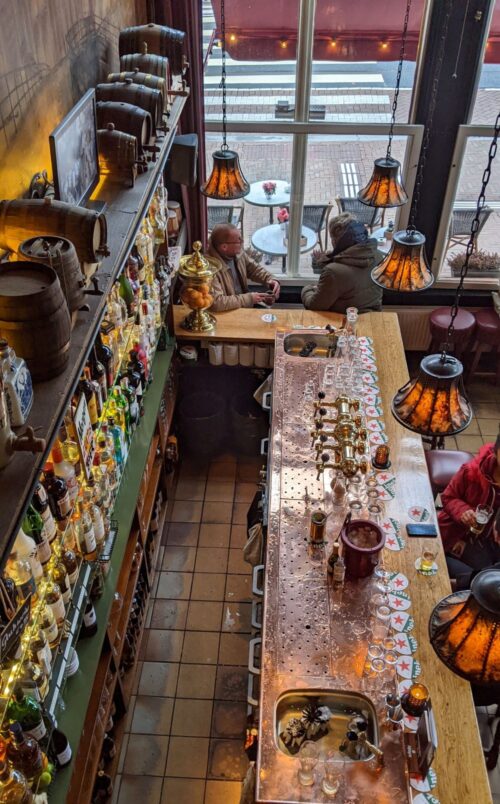
Lunch café: Gartine
While Gartine has its own moestuin (allotment), it’s not quite as close to the restaurant as de Kas’s – which is hardly surprising given that Gartine is sandwiched between the Kalverstraat and the Rokin in the centre of town. I should more properly call it a “tearoom”, as it’s open for breakfast, lunch and high tea, but not dinner. The location is delicate and classy, but in an old-fashioned way – as if your grandma had taken a degree in interior design. The food is likewise: eggs benedict with salmon for breakfast, crayfish rillettes for lunch, and a plethora of tarts and cupcakes at tea time. While the menu doesn’t exactly scream Dutch, everything is made with such local products that I think it classifies for inclusion.
Pancakes: Pannenkoekenhuis Upstairs and Pancakes Amsterdam
You can’t visit Amsterdam without trying the legendary Dutch pancakes, and I have two top tips for where to taste them. My most-loved Dutch pancake house is Pannenkoekenhuis Upstairs, which is (unsurprisingly) up an extraordinarily steep and narrow flight of stairs – even by Holland’s standards. It’s a tiny place, and easy to miss, but worth it once you get inside. Teapots hang from the ceiling in every size and shape, while the pancakes are the diameter of dinner plates and as thick as pizzas, with both sweet and savoury toppings. Try a hearty classic like ham and cheese (add pineapple if you’re feeling the Hawaiian thing), or go sweet with apple, cinnamon and whipped cream.
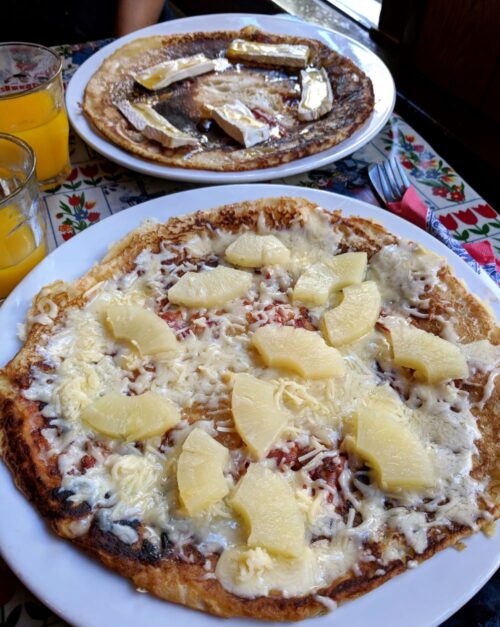
Meanwhile, Pancakes Amsterdam serves some of the best pannenkoeken in the city, and while you will see plenty of tourists, locals do treat themselves to the occasional pancake there too. Of course, you can order the regular toppings (ham and cheese, apple and syrup, and so on), but you’ll also find some more adventurous combinations. I tried one of the house specials: camembert, ham, chicory and raspberry sauce – it sounds odd, but it was strangely addictive. Mr Foodie went for a sweet-n-savoury combo of bacon, bananas and chilli – it was equally tasty so I demanded we share.
Want to eat more than Dutch food in Amsterdam? Download my Amsterdam Restaurant Guide:
On your travels and want to use this article offline with GPS-guided navigation? Download the travel guide app via GPSmyCity!

